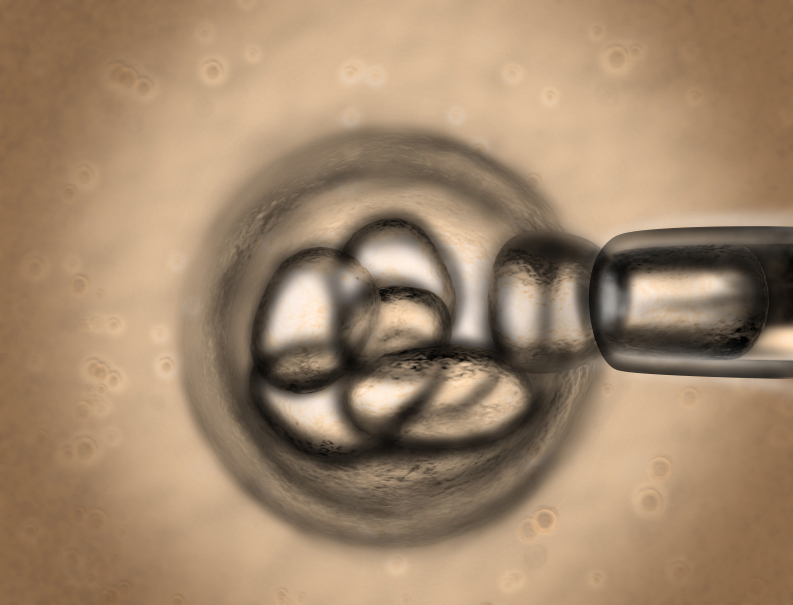Deputy Alain Claeys presented on 6 December 2006 the report from the parliamentary office for evaluation of scientific and technological options: “Researches on the functioning of living cells”. This report is an introduction to the public debate for the revision foreseen in 2009 of bioethics law of 2004. Public auditions have been organized on 22 November 2005, to write the report.
Distorted auditions
All scientists interviewed during these public auditions were in favour of cloning. From the introduction, Ketty Schwartz, vice-chairwoman of Inserm administration council and chairwoman of AFM scientific council announced the theme: cloning has to be permitted. Private auditions were also organized. Amongst the twelve contributors received during these auditions, seven of them come from the State and four from the AFM, favourable to cloning: the AFM chairwoman, General director of Généthon, and two managers of the I-Stem (French centre for research on embryo). The fifth represented a company of biotechnology.
Authoring research on embryo
The report denounces what it calls a hypocrisy of the 2004 law and considers that the requirement formulated by the law of a research “susceptible to permit major therapeutic advances” (art.25) is illusory and besides that it was interpreted in a very flexible way by the Biomedicine Agency. Consequently, it considers necessary to pass from a prohibition regime, with derogations, to an authorisation regime for research on embryo, controlled by the Biomedicine Agency.
As Axel Kahn says, “the derogatory prohibition is tactic skill and above all semantic invention to circumvent deputies who have religious convictions”.
Consequently, the report asks research on human embryo and embryonic stem cells be permitted if it has “medical purposes” and not anymore, if it is “susceptible to permit major therapeutic advances “.
Authorising scientific cloning
Admitting cloning is not therapeutic, Alain Claeys asks for its authorisation and from now proposes to call it for more transparency: “nuclear transposition”. Nevertheless, even called “nuclear transposition”, cloning always consists in inserting the nucleus of a stem in a enucleated oocyte to create an embryo; it is called “therapeutic” or “scientific” if the embryo obtained in vitro is not implanted in the uterus but destroyed to provide researchers with its cells; it is called “reproductive” when it aims at reimplanting the embryo to let it alive.
Towards an oocyte trafficking?
The legalisation of cloning would require hundreds of thousands oocytes. We know that the birth of the cloned ewe Dolly required 277 cloning attempts. The report enounces that the ethical conditions of oocyte donation are an essential prerequisite to any thinking on cloning. Thus it recommends now to organise a debate to establish rules and prevent oocyte trafficking. It proposes some leads, as to prohibit a minor from making a donation, the consent and the gratuity, the reimbursement of generated charges and non-perceived salary, the medical follow-up and the realisation of an epidemiologic study on the consequences of ovarian hyperstimulation. “An international action in favour of regulation of oocyte donation for research is essential to prevent exploiting women body, in particular in developing countries”.
Human cloning in the world
According to Claeys’ report, only A. Murdoch and M. Stojkovic team, from Newcastle University, succeeded in creating human blastocyst by cloning. However, no embryonic stem cell lines could be derived. Two or three teams only in the world, in England, in USA and in China carry on experiments on human cloning. After this inventory, we find it hard to understand the conclusions of the above-mentioned report which considers that the international competition is so cut-throat that the legislative evolution must be accelerated.
International texts
The United Nations declaration, (March 2005) prohibits “all kinds of human cloning insofar as they would be incompatible with human dignity and protection of human life ….” We recall that France voted against this text, which seems paradoxical as it complies with bioethics law of 2004 which maintains cloning prohibition.
The Oviedo Convention (of the Council of Europe on Human Rights and Biomedicine) also prohibits the constitution of embryos for research purposes. According to Alain Claeys, “this provision does not seem clear enough insofar as it could prohibit nuclear transposition (Note: in other words scientific cloning). It would be advisable that this point is clearly specified before France might ratify this Convention”.
The additional protocol of Oviedo Convention (12 January 1998) also prohibits “any intervention aiming at creating a human being genetically identical to another living or dead human being”. Holland, in a note from April 1998 interprets the term “human being” as referring exclusively to a born human individual. Claeys’ report recommends that France interprets it in the same way before ratifying these texts.
Social and economic challenges
A. Claeys raises other concerns: the possible future cellular therapies will be individualised treatments with a financing and a logic of individual insurances. How will react social protection systems?
Finally, there are less and less private funds invested in research on embryo and cloning. Consequently, the report recommends public investment. (Note: Nevertheless, before investing public funds, it would be interesting to understand why private industries do not invest or do not invest anymore in this field.)
Ethical or without ethic meaning
Claeys’ report does not treat the fundamental ethical issue related to dignity and respect to human embryo. It considers scientific cloning as an established fact which, once resolved the question on oocyte supplying, will only cause some difficulties at economic and social level. Anne Fagot-Largeault summarises the general idea of this work: “the technique of transfer or transposition of the nucleus is morally neutral in itself. All depends on what we do with it.

